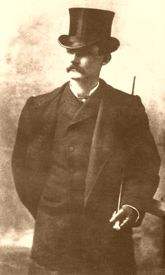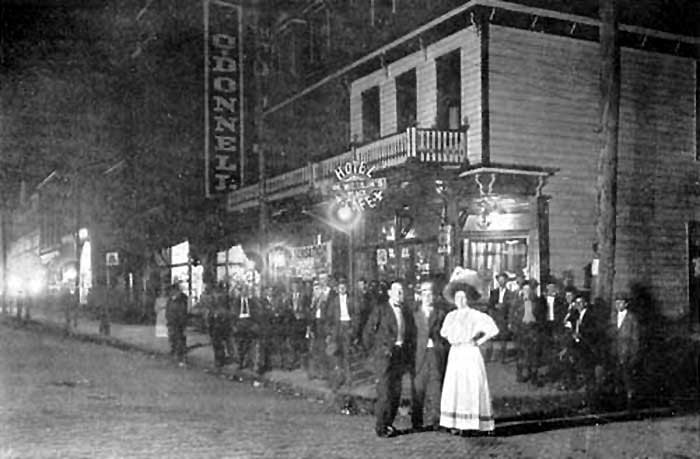Luke Short, best known in history as a gunfighter, was a very successful professional gambler and gaming promoter, one of the best-known and wealthiest sporting men in the United States.
Perfecting his skills in places such as Leadville, Colorado; Tombstone, Arizona; Dodge City, Kansas; and Fort Worth, Texas, he often became a target. He became friends with other wealthy sporting men, such as William H. Harris, Jake Johnson, and Bat Masterson, who helped broaden his gaming interests to include thoroughbred horse racing and boxing.
Whether it was because of his profession or perhaps his small stature, Short was involved in several dangerous disputes and found himself on the winning end of two of the most celebrated showdowns in the Old West—the Oriental Saloon Gunfight with Charlie Storms in 1881 and the duel with Jim Courtright in Fort Worth, Texas, in 1887.
By the 1890s, Short was most involved in the racing of thoroughbred horses, and in the early part of 1890, he would have horses running on tracks in Chicago and New York and many places around the country. In Memphis, he and two other men – Jake Johnson, a wealthy Texas businessman, and a gambler named Charles M. Wright- were involved in the horse races and became partners in some faro games. When Wright was placed in charge of their earnings, rather than putting the money in the hotel safe, he kept the cash in his hotel room and was robbed of the entire amount. This obviously caused friction with his partners, and hard words were exchanged, especially between Short and Wright.
Following the racing circuit occupied much of Short’s time during the late spring and early summer of 1890, but by winter, he had returned to Fort Worth, Texas. The long-simmering feud with Charles Wright would finally reach its boiling point. On December 23, 1890, Short entered the Bank Saloon and gambling house that Wright owned. Intending to shut down Wright’s gambling endeavors, Short evicted the patrons at gunpoint. Wright retaliated by aiming a shotgun at Short and blasting him, wounding Short in the left hip and leg as well as injuring his left hand. Short retaliated by drawing his pistol and shooting Wright in the right wrist, preventing him from making another shot. Both men then sluggishly separated ways, with Short going out to meet his friends while Wright stayed in the building clutching his wound.
In describing Short’s leg wound, the local paper said, “The full charge of buckshot passed through the flesh, making a tunnel, the muscles on the outside were torn out.” The wound on his left hand resulted in his thumb being “taken off at the joint.”
It was considered the “most exciting affray” in Fort Worth since the shooting of Jim Courtright almost four years before. Reports of the shooting, along with updates on Short’s condition, were published in newspapers in several states. A paper in Hutchinson, Kansas, observed that “his wounds are enough to kill a common man, but Luke may get well.”
Short would remain bedridden for months. In 1891, a Chicago newspaper published a lengthy profile of Short. When discussing the gunfight with Wright, the paper reported: “It was supposed at the time that Short was fatally wounded, and his recovery was wholly due to the careful nursing of his wife, who for three months hardly left his bedside.”
Both Short and Wright were indicted and charged with assault with intent to murder. Both men made bonds without trouble in the sum of $1,000. The trial date was changed more than once, and a final decision was not reached until March 1, 1892. In the end, Short was found guilty of aggravated assault against Charles Wright, and a fine of $150 was assessed against him.
By Kathy Alexander/Legends of America, updated April 2024.
Also See:
Luke Short – A Dandy Gunfighter
Luke Short-Jim Courtright Duel
Sources:
DeMattos, Jack & Parsons, Chuck; The Notorious Luke Short – Sporting Man of the Wild West, University of North Texas Press, 2015.
Wikipedia


